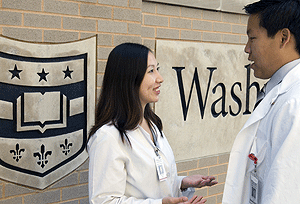Between graduating from the School of Medicine and beginning a Rhodes Scholarship this fall, Leana S. Wen will be blogging about her observations in Rwanda, the Congo and Burundi, Africa. She has been chosen, along with a Chicago teacher, to accompany New York Times columnist Nicholas D. Kristof on a three-week reporting trip to Africa this summer.

“I believe that doctors are in the best position to correct injustices in the world because we are the natural storytellers for our patients,” Wen said. “We see our patients’ problems, we hear their needs and we have an obligation to communicate them to the world.”
This is the second year that Kristof, a two-time Pulitzer Prize winner who writes about health, justice and social issues in Third World countries, has sponsored a contest for essayists to accompany him to Africa. Wen’s and high school teacher Will Okun’s essays were chosen from entries submitted by more than 2,000 American college and graduate students and middle school and high school teachers.
Wen said while in college, she considered becoming a foreign-affairs journalist before choosing medicine.
“I chose medical school because I wanted a more direct way of changing the world,” she said. “Now, I recognize that both sets of skills — direct medical practice and communication to the public — are important for what I want to do.”
Among the things she wants to do are shape public policy in a way that addresses global injustices, as well as serve as an emergency medicine physician.
Wen’s early experiences strongly influenced her current pursuits. When she was 8 years old, her family immigrated to the United States from Shanghai, China, in search of a better life. They hoped to escape the repressive Cultural Revolution, during which her parents, a professor and an engineer, spent time in jail because they were academics.
Her parents also wanted to find a healthier environment for Wen, who suffered from severe asthma attacks that resulted in frequent trips to the hospital and a partial lung removal.
The new environment in the United States proved therapeutic for her health: Wen hasn’t had an asthma attack since moving here.
But relocating was difficult. Because her parents couldn’t find good paying jobs that matched their former status, her family spent years living in impoverished conditions. Wen helped support them by participating in piano competitions, working at summer camps and doing odd jobs.
She entered California State University, Los Angeles (CSULA) when she was 13, earning a bachelor’s degree in biochemistry, summa cum laude, in 2001 at age 18.
While at WUSTL’s medical school, Wen’s list of accomplishments also has been impressive. She took a leave to serve a one-year term as national president of the American Medical Student Association (AMSA), the nation’s largest independent organization of physicians-in-training, based in Reston, Va.
As president, her duties included representing 65,000 physicians-in-training, conducting leadership training for 125 national leaders and overseeing a $3.5 million budget. She led AMSA to introduce three pieces of legislation in the 107th Congress and founded the Medical Student Disaster Relief Program in the wake of Hurricane Katrina.
Wen served as a Global Health Fellow at the World Health Organization in Geneva researching trade policies and access to medicines and as a U.S. Department of Defense David L. Boren Fellow working on conflict and HIV in Kigali, Rwanda.
She has been appointed by the secretary of the U.S. Department of Health and Human Services as a member of the Council on Graduate Medical Education, which advises Congress on physician workforce and medical education.
Additionally, Wen received the medical school’s Antoinette Frances Dames Prize in Physiology, a James E. Slater Award from the Phi Kappa Phi national honor society, a Katherine E. Carter Award in Scientific Writing, the CSULA Raul Henderson Eagle Pride Award in Service and Leadership, a National Institutes of Health Fogarty Minority International Research Training Fellowship, an Arnold and Mabel Beckman Foundation Research Fellowship and a Howard Hughes Medical Institute Biomedical Professional Development Scholarship.
Despite her many responsibilities, Wen finds time for Middle Eastern dancing, creative writing and running.
Through her Rhodes Scholarship, Wen will pursue a master’s degree in economic and social history at the University of Oxford this fall.
“Addressing inequities in health, in the U.S. and globally, is the driving force in my life,” she said.